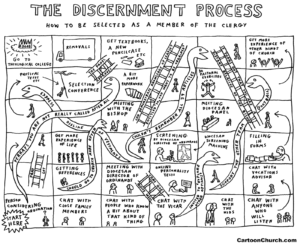This is how Christians are taught Discernment
This confusing process discourages true growth
What is discernment? Following the first Law of Logic, Law of Identity, this question must be clearly answered or any discussion becomes meaningless, confused and degenerates into a morass of rules and platitudes. The Free Dictionary defines discernment as, “The act or process of exhibiting keen insight and good judgment.” Notice the problem with this definition?
It uses words that need further clarification which is not provided such as keen, insight and judgment. In other words, this definition leads to more questions rather than clarification. The Bible definition is more succinct. Discernment is for, “the mature, for those who have their powers of discernment trained by constant practice to distinguish good from evil (He 5:14).” The Bible spends its many pages defining mature, good and evil both by example and by concept. However, there are two conditions that are mandatory for the biblical practice of discernment.

This trite phraseology the world substitutes for
discernment – It’s wrong on many levels
The biblical practice of discernment first of all requires the mind of God; in other words, one must be saved. This is not to say discernment cannot be practiced by the lost for they practice it everyday in their chosen professions through learning, training, practice and experience. These are the same pathways used by the Christian because they are detailed in the Scriptures throughout its pages. However, just as one cannot practice medical discernment without becoming a doctor with experience; one cannot practice biblical discernment without becoming a Christian through faith in Christ. One must be born again (Jo 3:7). That is, you must have the mind of God in you; you must be a new creation (2Co 5:17). Ever wonder why the Old Testament saints had such a difficult time following God? They did not have the New Covenant, the promise of His indwelling Spirit (Je 31:31; He 11:13). Without salvation one does not have the mind of Christ; therefore, one cannot practice biblical discernment because the lost rejects the truth of God to live the lie of sin. There are NO rules to compensate for this rejection of God’s truth (Ro 1:28). Christians are in a process of sanctification {being matured into the image of Christ}. Each of us were born in sin, trained to think in sin and confused by the indwelling new nature. With our bodies of sin we continue to serve sin but with our minds we should be serving Christ (Ro 7:25). However, for this to occur we must be shaped by both the Scriptures and the perismoi {testings} so that we learn the deceitfulness of our flesh and to rely on the indwelling Holy Spirit. But, there is one component that many teachers of discernment do not dwell upon and it is essential also.
The mind must be trained to think properly. People are not taught how to think. Instead, they are given confusion rules in the guise of principles as a substitute for thinking. The Old Testament Jews had the Law {system of rules} for 1400 years before Christ came and most of them missed the truth of the Law. David understood the truth of the Law and wrote it in Psalm 51, “The sacrifices of God are a broken spirit; a broken and contrite heart, O God, you will not despise (17).” The reason Matthew arranged the Sermon on the Mount was to show Christ’s teaching about how the Jews missed understanding the truth of the Law. They followed the rules but did not know its underlying truths that would have guided them in ALL circumstances. Rules are a guide to the immature until they begin to grow in maturity; they are guidelines. Principles that are distilled from Scripture are actually rules that have been ripped from their Scriptural context. This is modern man’s attempt to turn an art form into a science. Unfortunately, discernment is not a science. Discernment is not a series of observations leading to a conclusion about some theory of life. Discernment is not measurement of repeatable phenomenon; therefore, it is not a science. Making a set of rules does not make it a science either. In fact, such a process only confuses the truth of discernment; it is a learned understanding and application of God’s truth which only a mind of God can understand and practice.
I spoke previously about the rules of logic, of how to think. Actually, they are guidelines that are so simple that even the lost can grasp them {Defined by Aristotle in the 4th century BC}. These simple guidelines are: 1) Law of Identity; 2) Law of Excluded Middle; 3) Law of Non-Contradiction and 4) Law of Reasoned Inference. These are simple to learn and easy to practice. Law of Identity was demonstrated at the beginning of this post by defining our term: discernment. Law of Excluded Middle means there are only two positions. The light is either on or off; there is no third condition. Now, it can have various stages of on but it is still on. To deny it can have various stages of on is to commit the logical fallacy of the False Dilemma {common occurrence in politics}. Another example is the discussion of Free Will. Bible teaches one is either saved or lost, there is no other position. However, free will demands a mind that is neither saved nor lost if it is to make a choice free of influence. The Law of Non-Contradiction means a statement is either true or false, it cannot be both true and false. I am either at home or at the store but I am not in both places simultaneously. These three guide one’s thinking so that reasoned inferences can be drawn from given conditions. We draw conclusions all the time; however, because of faulty thinking we often arrive at incorrect conclusions which result in unintended consequences {effects we did not intend to occur}.
To learn discernment requires a two-fold approach. One must be saved to have the new nature {mind of Christ} is a pre-condition to learning biblical discernment. One must practice using the Laws of Logic in everyday life until they become second nature. Even the lost can practice this within their limited scope of understanding. The crucial step is the understanding of Scripture which will be a life-long learning process to understand the mind of Christ. Paul toward the end of his life admitted that he could only view the truth of Christ as through an enigma because he still possessed the body of sin (1Co 13:12). We can do no better but many of us settle for much worse by not attempting to understand the Bible. Christians sit in churches each week being taught stories, platitudes or rules of behavior without being taught how to understand and use the Bible. Without this knowledge they will not be able to grow in spiritual maturity and thus will only haphazardly practice discernment. Thus, rules are substituted for biblical learning; principles replace theological thought. God’s people perish for lack of knowledge in a hall filled with understanding (Ho 4:6).


